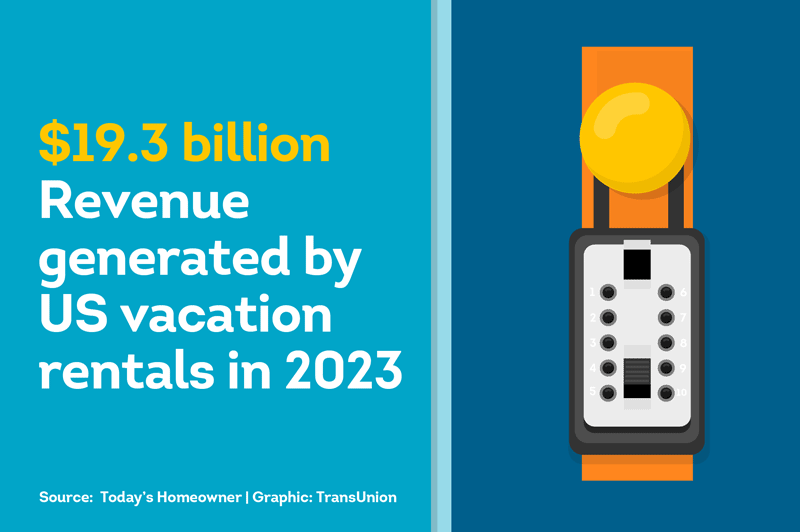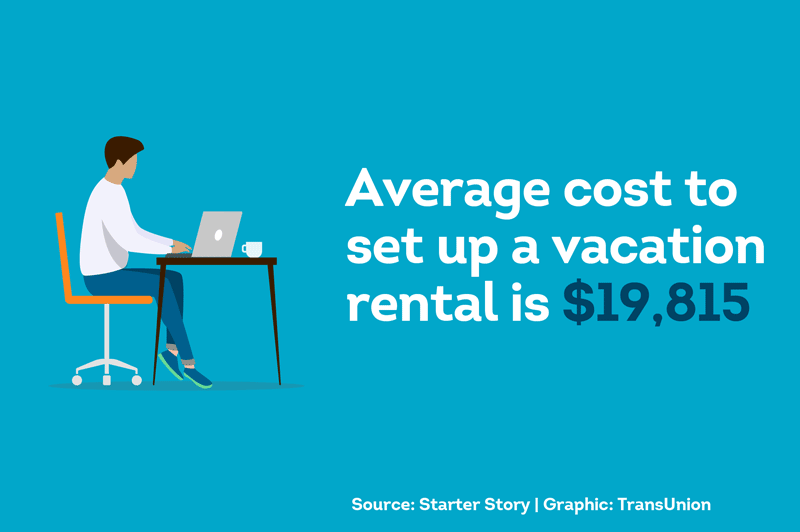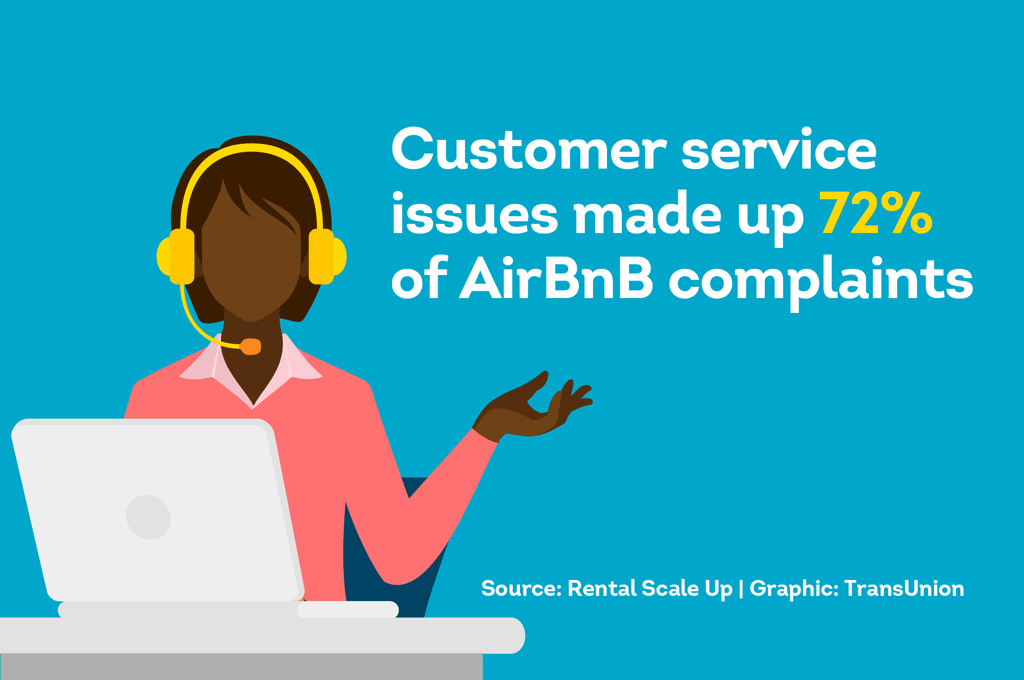Summary:
Managing vacation rental properties can be a lucrative venture for independent landlords, but it’s not without its risks. If you want to start your own vacation rental business, it’s important to estimate your expenses, polish communication skills, create plans for cleaning and maintenance, know how to select the right guests, market your property effectively, have someone on call in case of issues, and prepare for remote management. Knowing some major watchouts can help you decide if vacation rental property management is right for you.
Disclosure:
This content, except as otherwise indicated or stated on this site, is the property of TransUnion Rental Screening Solutions, Inc. This content is for educational purposes and for convenience only. Trademarks used are the property of their respective owners, and no endorsement or affiliation is implied. The information presented in this content is “as is” without warranties of any kind, and specifically is not represented to be complete and does not constitute legal advice, and is subject to change without notice. You are encouraged to check these terms from time to time for changes, and by accessing this site you agree to these terms and all terms listed. Laws and regulations may vary by state and locality. Consult your own counsel if you have legal questions related to your rental property practices and processes.
Disclaimer:
Remember that this material is intended to provide you with helpful information and is not to be relied upon to make decisions, nor is this material intended to be or construed as legal advice. You are encouraged to consult your legal counsel for advice on your specific business operations and responsibilities under applicable law. Trademarks used in this material are the property of their respective owners and no affiliation or endorsement is implied.
Managing a vacation rental property can be a bit like juggling lit torches. If you know what you’re doing, you’ll barely feel the heat. But, if you’re not prepared, you can really get burned.
According to publication Today’s Homeowner, U.S. vacation rentals generated a revenue of $19.3 billion in 2023––and 70% of those rentals were run by independent property managers rather than companies. Given the lucrative opportunities, it’s understandable that many traditional landlords want to get in on the industry. However, while earnings can be high, vacation rental property management carries its own risks.
One big risk is that, unlike long-term renters, you may not really know who will be in your property. With long-term renters, almost all independent landlords do comprehensive tenant background checks through services like SmartMove®. However, with short-term vacation rentals, you don’t always have that luxury.
While sites like AirBnb, Booking.com, and VRBO, do have some damage recovery programs, these can take weeks to get resolved, which can delay payment, repairs, and renting your vacation property again. This could mean losing money on an investment that was supposed to help you get ahead.

Knowing potential risks, tips, and watchouts can help you manage your vacation rental property more successfully. Here are the top seven things to look out for managing vacation properties:
1: Watch out for Expense Creep
Short term vacation rentals are on the rise and, according to Grand View Research, should continue to grow at an annual compound growth rate (ACGR) of 4.7%. While this data can pique the interest of forward-looking independent landlords, it’s important to think about all financial realities of starting a vacation rental business.
In traditional rentals, properties are often unfurnished and renters mostly keep to themselves. However, vacation rentals typically come fully furnished, connected to utilities, and with a higher expectation of service and communication. All of this can mean higher start-up costs.

According to entrepreneur website Starter Story, setting up a vacation rental costs $19,815 on average, but can climb to double or even triple that in some cases. To help make sure you’ll come out on top, it’s essential to know how to set a fair market rate for your vacation rental, and to know what costs to include in your estimates.
As you consider what managing a vacation rental might cost, here are some ideas for expenses to include in your calculations:
Start-Up Costs
- Purchasing the property with all necessary taxes, insurance, etc.
- Necessary repairs and builds to get property up to code and habitable
- Initial upgrades to add amenities tenants and guests want
- Utilities such as electricity, water, gas, garbage pick up, and internet
- Necessary emergency equipment, such as fire extinguishers, first aid kits, etc.
- Any necessary inspections or licensing
- Administration costs, such as printing instructions or welcome books
- Furniture, curtains, bedding, towels, and other furnishings
- Items to make the place more comfortable, such as decor or games
Ongoing Costs
- Routine maintenance
- Monthly mortgage
- Property damage
- Property taxes
- Local taxes
- Insurance
- Listing fees
- Monthly utility bills
- Replacement items, such as glasses or plates
- Monthly utilities
Striking a balance between creating a comfortable, attractive vacation rental space and increasing your profit margin can be difficult. If you’re not careful, expense creep can eat away profits. Make sure to keep both income and expenses in mind when you're considering running a rental business.
Pro Tip:
Managing rental properties isn’t the only way to make a little extra as an independent landlord. Learn some other tips to maximize your rental income.
2: Guest Communication, Especially During Check-In/Check-Out
Do you have the skills to be an AirBnb or similar vacation rental host? The skillset is quite different from what’s required as a traditional landlord. To start, as a vacation rental, reviews and ratings can make or break your business––and that means providing excellent customer service.

According to a survey by property site Rental Scale Up, “customer service issues” were responsible for 72% of AirBnb customer complaints on Twitter.
The top complaints included things like:
- Poor support in emergencies
- Unreachable hosts
- Rude behavior towards guests
- Disorganized and chaotic communication
- Making promises, but not delivering
As an independent landlord, you may only see your tenants a few times a year, usually only if there’s an issue or during a scheduled property inspection. However, a manager of a vacation rental could see new guests potentially every single day.
Providing good customer service is a hands-on job that takes effort. You have to make sure you have the time and energy to commit to helping guests if they need it––even in the middle of the night.
Some ways to improve communication with vacation rental guests include:
- Create a welcome or informational packet with answers to FAQs and provide it to guests ahead of time
- Make sure guests know who to contact in case of an emergency
- Make sure you or a designated person is ready to respond to guests in a timely manner
- Provide clear check-in/check-out instructions that don’t leave guests waiting
If you don’t think you’re up for such hands-on customer service, you want to consider hiring a property manager for the job.
3: Plans for Cleaning and Maintenance
Unlike in a traditional rental, vacation rental managers are responsible for the bulk of the cleaning tasks and all maintenance. These tasks can eat up a significant amount of time each week. If you outsource them, that also means less profit for you. Finding a lucrative middle ground is possible. That is, as long as you know what to expect ahead of time.
Here are some common cleaning and maintenance considerations in vacation rental property management:
Cleaning
The property should be clean and ready for each new guest that comes to stay. If it isn’t, it could impact your reviews and discourage others from booking. Cleaning might mean taking out trash, wiping down counters, vacuuming, or depending on the previous occupants, even getting the smoke smell out of the place.
Passing Cleaning Tasks onto Guests
Some hosts may ask guests to complete cleaning such as washing dishes or even sheets in their house rules. While this can be helpful for light tasks, it can also be risky. Not everyone has the same cleanliness standards and may cut corners if they're trying to leave in a hurry.
If you ask your guests to pick up the slack, make sure you have a system in place to check the cleanliness. You don’t want to get docked by the next guest that comes in for dirty dishes in the cabinets.
Charging Cleaning Fees
Other vacation property owners add a nightly or one-time cleaning fee to the rental cost to offset professional cleaning costs. However, this can create ill will with guests. According to news site OregonLive, some AirBnb hosts that charge cleaning fees also discover that guests leave property dirtier than when they don’t charge cleaning fees at all.
Additionally, you should know that AirBnb is experimenting with gradually fading out cleaning fees as a separate charge, according to money site NerdWallet. With this change, your property could be displayed as the total cost (rather than the nightly cost), which may impact who sees your property and who is willing to stay there.
Maintenance
From burned-out lightbulbs and water damage, to guests who can’t figure out how to get the oven to work, vacation rental managers are responsible for fixing everything. This includes both major problems and even the normal wear and tear issues that are typically fixed by traditional renters.

As you prepare for maintenance plans and expenses for your vacation rental property, here are some tips to help you out:
- Get good insurance and figure out what happens in the case of damages caused by guests ahead of time
- Learn what, if any, protections your listing sites (e.g. AirBnb, Booking, etc) provide for guest damages
- Create a contract, similar to a lease or rental agreement, that outlines house rules and who is responsible for what damages ahead of time
- Build relationships with go-to contractors, so you already have contact when you need help
- Don’t rely on guests to report problems. Build regular inspections into your maintenance schedule, including HVAC and pest control
- Consider a security deposit for any damages, if allowed
Pro Tip:
Rental insurance goes beyond just vacation properties. See the top 5 reasons to require all tenants to have renter’s insurance.
4: Selecting the Right Guests
In a traditional rental scenario, you may be tasked with finding good tenants only a few times a year. However, in a vacation rental situation, you may need to select renters a few times a week.
Thankfully, there is an overlap between the eight qualities of good tenants and characteristics of good vacation renters. In general, renters should be good communicators, organized, respectful, and not a threat to your property or neighbors.
As you select and prepare your vacation property, here are some tips for keeping your guests, neighbors, and property safe:
Set House Rules
Many people experienced in vacation rental management set house rules. These guidelines establish what’s expected, what’s allowed, and what’s off-limits. Some items that might be included in vacation rental rules include:
- Check-in/out times: Be clear about when guests are expected to vacate the property and any special instructions for what to do with keys, etc.
- Smoking: Are guests allowed to smoke inside Outside Anywhere on the property
- Parties: Are parties allowed What about extra, unregistered guests
- Amenities: Do you have amenities like hot tubs, fireplaces, boats, grills, saunas, or anything similar Make sure to spell out what guests are allowed to use and give clear operating instructions to help prevent damage due to misuse.
- Pets: Are you okay with paws and fur on your furniture Check out the pros and cons of allowing pets in rental properties, then include your decision in your house rules.
- Cleaning: Include any required cleaning and where to find the necessary supplies.
- Security deposit: Include clear information about any required deposit and how it can be used.
- Penalties for breaking house rules: If someone breaks a rule, what will happen Will they be charged Kicked out Before including penalties, find out what’s legally allowable in your area.
Before allowing guests in your property, have them sign an agreement acknowledging they’ve reviewed the house rules, will follow them, and accept any penalties for breaking the rules. Again, check with your legal counsel to verify what charges or penalties are allowed in your area.
Know Who You’re Letting in Your Property
It can be risky to hand over your keys to a new person every few days––especially if your vacation rental contains your personal possessions. To help protect you and your property, it’s essential to know exactly who you’re renting to ahead of time,
- Ask for a legal photo ID (where allowed): Depending on your area, you may be required to make a copy of a Driver’s License or Passport. In other places, you may be prohibited from doing so. Wherever possible, make sure to get as much contact information about your guest as possible. You should have their legal name, photo ID (where allowed), phone number, and email address in case you need to get into contact with them.
- Consider running a background check: Some listing sites, like AirBnb may provide limited background checks for certain site users, but it may be difficult to know exactly what they’re reviewing. When it’s possible, consider getting a more robust background check on vacation renters, including a criminal records check. With SmartMove, you can get an online background reports on-demand, so you don’t need to waste any time waiting for results to make your decision.
Do note that background check laws can differ from place to place, please consult legal counsel for applicable background check laws.
5: Effective Marketing
Once you have a great vacation rental property, it’s time to get the word out. However, sometimes that’s easier said than done. It’s important to factor in the time and effort marketing your property may require, especially at first.
Aggregate sites like AirBnb, booking, and VRBO help your property show up on searches, but you need to make it stand out. No one wants to stay in a place with bad or too few pictures and little-to-no description. Whether you’re posting on an aggregate site, social media, or your own website, it’s essential to know how to write an effective rental ad and take flattering pictures.
Also, don’t underestimate the time it takes to take, edit, and post photos, write ads, and update multiple sites as you go. If you have a web presence outside of the vacation property rental aggregate sites, you may also consider creating a social media account for your properties. You can use these to show off their great qualities and nearby amenities.
6: On-Call Assistance
In the Rental Scale Up survey mentioned above, “insufficient response and support in emergencies” was one of the top guest complaints on AirBnb. Unlike being a traditional landlord, vacation rental property management is a 24/7 job.
If you want to provide good service, you need to have someone available if the heat stops working, if there’s a lockout, or if a guest has an emergency. Even if there are no emergencies, you need someone to deal with common renter complaints like noisy neighbors, bad smells, or other undesirable characteristics.
To help your guests prepare for unexpected surprises:
- Provide clear instructions to guests for what to do in an emergency
- Leave a 911 emergency card with your property’s address in a prominent place
- Keep emergency equipment like fire extinguishers and first aid kits on hand and up to date
- Give proactive warnings if there are activities in your area that may impact a guest’s stay or safety, such as blocked roads, a boil order, or other disruption
7: Remote/Out-of-State Management
Remote management is becoming a more attractive reality to many landlords, especially in a post-pandemic world. Having a completely hands-off vacation rental management setup is possible, but does require some upfront work.
The rental management software company Stessa provides the following recommendations for setting up a remote property business:
- Build a local team, including managers, housekeeping, and maintenance
- Use online services to conduct things like tenant background checks, collect rent, and sign agreements
- Automate as much as possible, including welcome emails and communication
- Schedule regular inspections and visit in person occasionally
Pro Tip:
Check out How to Be a Remote Landlord for even more tips on what you can accomplish, even from far away.
Prepare for Short or Long-Term Renters with SmartMove
The details and responsibilities of managing vacation rental properties can make you feel like a circus acrobat, but you don’t have to go tumbling into the unknown alone. Help simplify your vacation rental with ultra-fast, same-day tenant screening through SmartMove.
Do your potential short-term guests have a history of criminal property damage that could mean disaster for your rental Criminal records reports searches through hundreds of millions of federal state-level records, for a potential match for your potential guest. Meanwhile, an eviction check helps you see past eviction-related proceedings related to your potential guest.
Whether you’re renting short or long-term, it’s essential to know that your tenant has the ability to pay. Learn about their financial history with a tenant credit report which may help you make more confident leasing decisions.
Made specifically for independent landlords with only occasional screening needs, SmartMove provides lightning-fast screening reports that are backed by TransUnion––a major credit agency with nearly 40 years of data expertise.
Because all reports are done on-demand and online, you don’t have to wait around for results. Your background check begins the moment your applicant consents to the process. There are no waiting times, no hidden fees, no subscriptions, and no hassle.
Spring more confidently into vacation rental property management with tenant screening through SmartMove.
Know your applicant.
Additional Disclosure:
Remember that this material is intended to provide you with helpful information and is not to be relied upon to make decisions, nor is this material intended to be or construed as legal advice. You are encouraged to consult your legal counsel for advice on your specific business operations and responsibilities under applicable law. Trademarks used in this material are the property of their respective owners and no affiliation or endorsement is implied.



